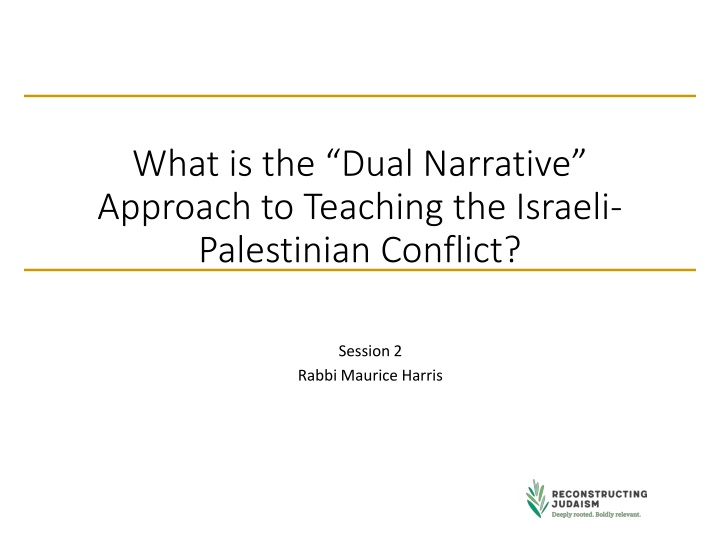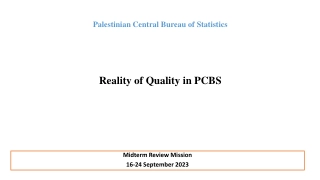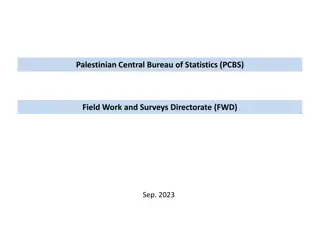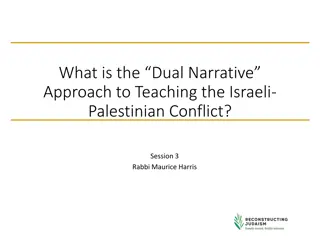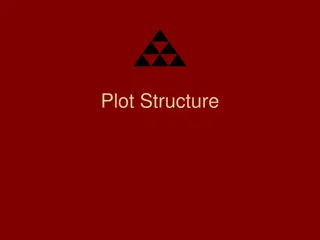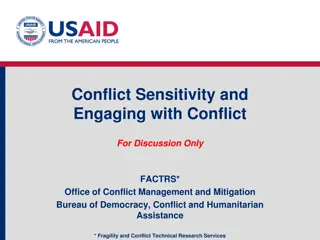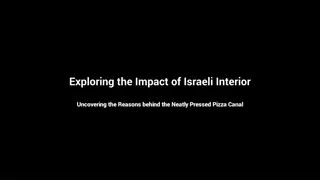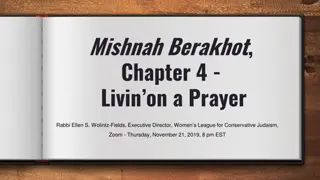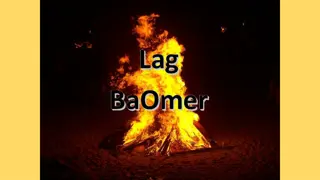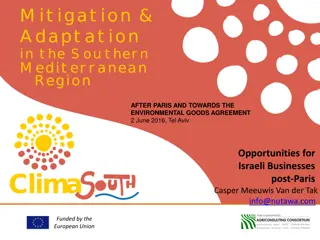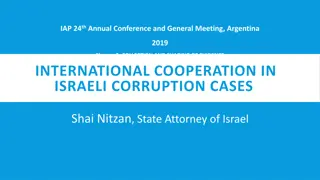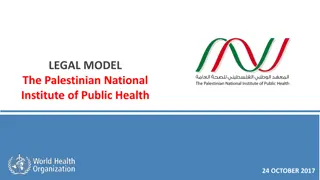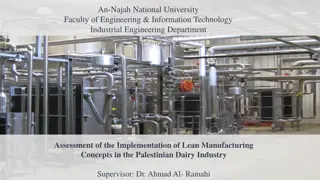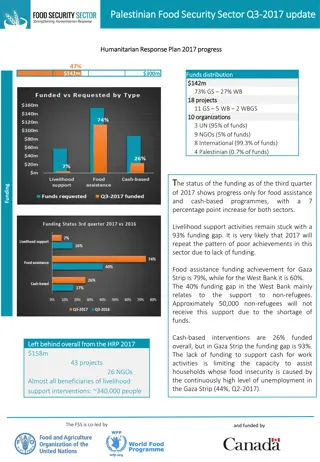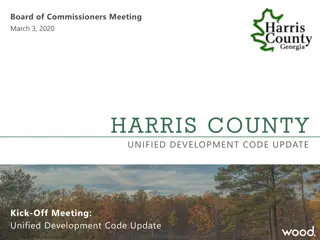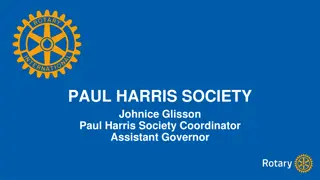Teaching the Israeli-Palestinian Conflict: Dual Narrative Approach with Rabbi Maurice Harris
Explore the innovative Dual Narrative Approach in teaching the Israeli-Palestinian Conflict, as discussed in a session led by Rabbi Maurice Harris. The session covers opening prayers, reflections on readings, strategic planning, and potential challenges in implementing the approach. Participants engage in discussions to foster understanding and empathy, with a focus on promoting peace and reconciliation in the region. Join the journey towards a more nuanced understanding of this complex conflict.
Download Presentation

Please find below an Image/Link to download the presentation.
The content on the website is provided AS IS for your information and personal use only. It may not be sold, licensed, or shared on other websites without obtaining consent from the author.If you encounter any issues during the download, it is possible that the publisher has removed the file from their server.
You are allowed to download the files provided on this website for personal or commercial use, subject to the condition that they are used lawfully. All files are the property of their respective owners.
The content on the website is provided AS IS for your information and personal use only. It may not be sold, licensed, or shared on other websites without obtaining consent from the author.
E N D
Presentation Transcript
What is the Dual Narrative Approach to Teaching the Israeli- Palestinian Conflict? Session 2 Rabbi Maurice Harris
Todays Session in a Nutshell 1. Opening: Two opening prayers from two different sources, and review of goals. 2. What brought you here? (2 people share) 3. Your thoughts on the reading 4. Safety & Risk: Structural Choices for Planning Dual-Narrative Events 5. Problem with Dual-Narrative: Power dynamics can be obscured. 2
Opening Kavannah 1 El Malei Rachamim, God Full of Compassion, who heals the broken-hearted and binds up their wounds, we ask You to show all Your children the way of love and compassion, so that hatred ceases to scar their lives. Ein Chayyim, Source of Life, we call upon You to send Your abundant blessings into every home, Israeli and Palestinian, so that new hope may overcome old fears. Adonai Tzadik, Righteous One, who exhorts us to pursue Justice, we fervently pray that a spirit of righteousness may prevail, so that both peoples find the courage to reach a just settlement of their differences. Oseh Shalom, Maker of Peace, who teaches us to be seekers of peace, we entreat You now to spread Your tabernacle of shalom over all the inhabitants of Your land, and to support the peacemakers among both peoples in their efforts to walk the path of reconciliation, so that a just peace may reign supreme at last bimheirah beyameinu, speedily in our own day. And let us say: Amen. Rabbi Elizabeth Tikvah Sarah http://www.rabbiellisarah.com/prayer-for-peace-between-israelis-and-palestinians/ 3
Opening Kavannah 2 A prayer for peace in the Middle East God of justice, bless those who work for peace through justice. Strengthen their resolve in the face of seemingly endless violence. Guide the leaders of the people of the Middle East to know your will and to support a just peace for all of your children. God of love, lifting up the holy land for all humankind, breathe love and compassion into our prayers with a desire for nothing other than peace: peace in our hearts, peace for all creation, and especially peace in the land that is called holy. God of hope, we lift up the city of Jerusalem, distracted and divided, yet still filled with promise as all the cities of the world. Come again into our cities, places of worship, that we may be given sight to recognize you. God of mercy, even as we long to understand that which is often beyond our comprehension, we lay before you the hearts, minds and bodies of all those suffering from conflict in Palestine and Israel and from the ongoing occupation. Shower upon all the people of the Holy Land the spirit of justice and reconciliation. God of the nations, give to all our people the blessings of well-being, freedom, and harmony, and, above all things, give us faith in you that we may be strengthened to care for all those in need. Amen. [Modified from a prayer by the Church of Scotland] 4 http://www.churchofscotland.org.uk/serve/world_mission/get_involved/prayers-for-israel-and-the-occupied-palestinian-territories
Goalsof the network To become familiar with key elements of the dominant narratives in both Palestinian and Israeli societies (and their respective supporters). Or at least, to learn where to find good resources for same. To share experiences, information, resources, and ideas with each other. To imagine how you might plan programs in your communities based on a dual-narrative framework. This framework prioritizes the stories that Israelis and Palestinians tell themselves and the world about themselves and the conflict. To form relationships of mutual support around this topic. 5
Who are you, what brought you here, and whats important? Mussar background Leftist friends puzzled over his choosing to convert to Judaism won t that make you anti- Palestinian? During career has worked with peoples at war with each other. Seeking greater knowledge and understanding of both sides . Recent events at her synagogue have spurred renewed interest. Israel/Palestine always proves inflammatory in the congregation. Difficult conflict arose over a request by If Not Now to do programming in the synagogue. Interested to learn whether the movement can help them find a way to do discussions or programs on this issue that is civil and constructive. 6
Who are you, what brought you here, and whats important? Grew up in the 70s immersed in the Israeli mythology existential threat, heroic determination against powerful hostile forces. Later, was involved in some dialogue groups on these issues. Went on an Encounter tour, followed by a visit to Efrat (a settlement). Now lives in a place where center- left politics are the right wing of the spectrum, and it moves left from there. As a rabbi / educator, looking for ways to bring dual-narrative tools to bear on how Israel is taught. Involved in a group called Christian and Jewish Allies Working for a Just Peace in Palestine. Most of their work has been in church communities, with the goal of helping people to learn the other narrative i.e. Palestinian narrative, since it isn t as well known in the U.S. Looking to learn things that will help with her interest in bringing some of the dual-narrative concepts into Jewish community spaces without having the entire project dismissed out of hand out of fear. 7
Narratives 1. are as real as the other elements of a conflict. 2. invite and discourage. 3. reveal and obscure, include and exclude. 4. can be open or closed, to varying degrees. 5. can tell the truth and lie, even at the same time.
Israeli elements often left out of Palestinian narratives 10
181- partition 194- refugees 273- admission with 194 242 & 338- land 4 peace
For events in a shul 1. Advanced registrations plus sign-off on civility covenant 2. To complete registration, must respond to a few questions (see sample registration questions below) 3. Opening / closing ritual moment
For interfaith or public events 1. Greeters hand out civility pledge notecards. 2. Best events aren t debates they include speakers who give voice to both narratives, which can happen in various ways. 3. Scripted and mutually previewed & approved opening / closing ritual moment by clergy of multiple faiths. 4. Questions to the speakers must be written on notecards and handed to volunteers. 5. Publicity choices matter.
Suggestions Your Advice / Suggestions:
Code of Civility Respectful disagreement Respectful questioning For people who tend to like to share a lot, making sure that you leave room for others to participate Refraining from language that is bigoted or derogatory Assuming the best intentions, not the worst, if someone does say something that causes pain or offense ( ouch )
Code of Civility Allowing the use of politicized language while holding one another to a mutually agreed expectation to avoid bigoted or derogatory language. (This can be tricky.) This is a closed course no visitors or guests without the advance permission of the instructor.
Registration questions? In order to help the facilitator create a constructive learning environment for everyone, please respond to the following questions. Your responses will not be shared with anyone else in the class. 1. What hopes do you bring to this class? 2. What concerns or worries do you bring to this class? 3. What, if anything, do you want to know about the instructor? 4. Please tell us a little about your experiences and perspectives on this subject?
Facilitator self-identification I m a progressive rabbi with ties to the Israeli peace movement. I have close family in Israel and partly grew up there. I ve formed important friendships with Palestinians living in the West Bank and have come to care deeply about them. So on a gut level, Israel feels like family to me, and Palestinians feel like people I have deep feelings for. I respect, admire, and get frustrated by them both.
Next Steps Please read the selection you ll receive from this book. If you have questions or thoughts to share, please email them to Maurice at mharris@rrc.edu and he ll weave them into our next session. 20
